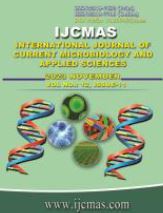


 National Academy of Agricultural Sciences (NAAS)
National Academy of Agricultural Sciences (NAAS)

|
PRINT ISSN : 2319-7692
Online ISSN : 2319-7706 Issues : 12 per year Publisher : Excellent Publishers Email : editorijcmas@gmail.com / submit@ijcmas.com Editor-in-chief: Dr.M.Prakash Index Copernicus ICV 2018: 95.39 NAAS RATING 2020: 5.38 |
Field experiments were conducted in farmer’s field at Lathuvadi village, Thalaivasal Taluk of Salem district to study the integrated nutrient management practices for sustainable cotton production in north western zone of Tamil Nadu during 2021. The experiments were laid with seven treatments and three replications in Randomized block design. The treatments were viz., T1 - 100% RDF, T2 - 75% RDN + 25% N through Vermicompost, T3 - 50% RDN + 50% N through vermicompost, T4 - 25% RDN + 75% N through vermicompost, T5 - 75% RDN + 25% N through Vermicompost + 1% MgSO4 + 0.5% ZnSO4 foliar spray, T6 - 50% RDN + 50% N through vermicompost + 1% MgSO4 + 0.5% ZnSO4 ZnSO4 foliar spray and T7 - 25% RDN + 75% N through vermicompost + 1% MgSO4 + 0.5% ZnSO4 ZnSO4 foliar spray. The application of organic manure and inorganic fertilizers along with the foliar application of micronutrients (Zn and Mg) to cotton significantly influenced the growth characters, yield attributed and yield of cotton. Among the various integrated nutrient management practices evaluated, application of 50% RDN + 50% N through vermicompost + 1% MgSO4 + 0.5% ZnSO4 ZnSO4 foliar spray (T6) resulted the enhanced growth characters viz., plant height, leaf area index, and dry matter production, Yield attributing characters viz., number of monopodial branches plant-1, sympodial branches plant-1, number of bolls plant-1, boll weight and heigher seed cotton yield. Hence, the application of 50% RDN + 50% N through vermicompost + 1% MgSO4 + 0.5% ZnSO4 foliar spray (T6) considered better way to get a better yield with sustained soil health.
 |
 |
 |
 |
 |